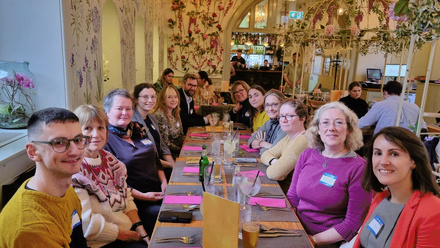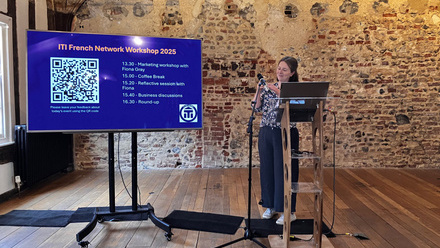Set up in style
Thinking of setting up a new regional or specialist network? Agata McCrindle talks you through the process (and there is a lot of help available!)
My role on the ITI board is ITI Networks Coordinator – which means I liaise with the coordinators of ITI’s different regional and specialist networks. I’m the person people can come to if they have any questions regarding networks; and equally, if other board members want to get in touch with the networks, I’m the person who sets that up.
I was asked to take on this role when I joined the ITI board in May 2022, because I set up the Polish Network a couple of years ago and I had also been involved with the Law, Insurance and Finance Translation (LIFT) Network since 2018. I believe very strongly that networks should be active. I think this is one of the reasons people join ITI – indeed, sometimes it is the main reason (especially if they have a rare language or speciality).
Networks offer the opportunity to check terminology, and access subject- specific support as well as training. And they also offer their own unique professional networking opportunities. We are freelancers – and it’s quite an isolated profession, so being able to network with each other is also important personally and socially, as well as professionally.
The steps you will need to go through
ITI members have set up a number of networks recently; so if you’re interested, what should you do? First of all, check the Setting up an ITI Network page of the ITI website , which will give you a lot of the information you need.
To get formal approval from the board, you will need three ITI members, and be able to give a brief description/ explanation of why you want a network and what you envisage from it. This could be, say, a specialist training that is not normally easily accessible; a language network so that you can have your own revision clubs and translation slams for practice; or an area for translators and interpreters to share specific experiences (for instance, of neurodiversity).
Once you’re approved you can set up formally, following the guidance. You may choose to set up with bylaws (ITI recommends this). You will need at the very least two people – coordinator and deputy coordinator – but it’s best to build a committee team to share the load. People have different skills, so there’ll be someone to take on running social media, editing a newsletter and so on. Have one email address for all committee members to use. You can have one or more passwords for all your social media accounts, but do make sure that all committee members know them. I’d also suggest that you have at least two signatories on the network’s bank account.
Once you have the network set up, the coordinator and deputy will have access to the coordinators’ section on the ITI website, which has lots of useful information, including access to ITI’s Zoom account and to the coordinators’ forum, where you can share knowledge with other coordinators and ask them for advice.
ITI may also be able to email translators and interpreters who fit your criteria, telling them about the new network. That’s what happened when we set up the Polish Network, and it meant we could also ask new members and prospective members what they wanted too: in our case that included language-specific training, translation slams, discussions on topics like productivity and negotiation, and more.
It can be hard work – which is why it’s essential, in my opinion, to build a good team, and one that is as big as you need it to be, depending on how much you want to do. But as we’ve found from the Polish Network’s experience, it’s so well worth doing and it really is one of the things that makes ITI what it is.
We asked network members what being part of a network means to them. Here is just a small selection of the responses we received…
The Polish Network has had a huge impact on me as both a translator and a person. In addition to the professional benefits it brings in the form of meaningful relationships with colleagues and excellent continuing professional development, it has also become a connection to my roots. I have spent very little of my life in the country where I was born, and I often feel disconnected from the place and its culture. Being involved in the network has made me speak more Polish, read more Polish books, watch more Polish films, and in general nurture a deeper sense of my heritage.
I’ve forged what I consider to be friendships with other members, whether they’re across the road in Glasgow or across the continent in Finland. Time constraints mean that I don’t attend as many events as I’d like, but overall joining the network has made me a happier, more fulfilled – and therefore better, surely? – translator and person.
Aleksandra Chlon
I find being part of the LIFT Network very beneficial. Just with a quick email, I can reach a multilingual group of subject experts who are always ready to share the benefit of their wisdom and experience. It feels like a ‘safe space’ to ask questions without anyone judging you for not knowing something or if you simply want reassurance on a particular point. The events are very useful and well organised and there’s a directory of members if you want to look for a colleague with expertise in a given field.
Laura Elvin
I’ve been a member of MedNet since I was a novice translator in 2017, and joining was probably one of the best things I did early in my career. The online forum is a mine of information, and if someone hasn’t already posted the answer, a member will quickly be along to help out with deciphering a mystery abbreviation or unclear text in a surgery report.
Best of all, it runs a mentor scheme and I was lucky enough to be paired with a fantastic mentor, David Beattie, who was generous with his time and so encouraging as I was getting started in medical translation. I am geographically remote from most members, as I’m based in New Zealand, so I can’t attend events in person, but having access to this amazing group of experts helps me feel less isolated.
Hannah Burdekin
The North West Translators’ Network (NWTN) is a great community of linguists from a wide range of backgrounds and language combinations who live locally to me, and it’s great to feel a part of something. I felt quite isolated when I first started out, so the chance to meet up with colleagues at co-working sessions, social and CPD events, without having to travel far, became a real lifeline for me. So much so that I became involved in the committee a few years ago.
Being a member has benefited me in so many ways that I don’t even know where to start! Support, advice, networking, social opportunities, a source of work via other colleagues...what’s not to love?!
Kate Lo
What does MedNet mean to me? In short, nearly everything. As a newcomer, it showed me that there were serious translators out there who specialised in medicine, that this was a realistic goal for me, and that I could experience true fellowship, and learn a huge amount, twice a year at MedNet workshops. It showed me that help could be an email away, and that I could help others (hesitantly at first, but later with growing confidence). And now, as an experienced professional, it keeps me going and helps alleviate the isolation.
Angela Dickson
I have been a member of the Scottish Network for seven years now and I love it. What struck me from the very first meeting was the feeling of conviviality and familiarity, and how welcoming the network was. I eagerly await each workshop as a joyous occasion, very much like meeting my extended family, with the added benefit of learning new things, sharing our skills and engaging with colleagues in a professional and personal way. My personal favourite is the traditional ceilidh in our summer workshops!
Elisa Cristóbal-González
STEP is a small, friendly, supportive and helpful network – although it does focus mainly on the ‘patents’ side – and it’s probably been one of my greatest sources of leads to good clients.
Alison Penfold
I had been a member for a couple of years before joining the NWTN committee, but I had always been a bit too shy to get involved. That all changed after attending the co-working sessions and meeting members who were friendly, welcoming and supportive.
The network’s social and training events have allowed me to connect with colleagues who have enriched my career, from sharing their knowledge and discussing tricky translations with me, to providing their friendship and encouragement. I also love members’ wide variety of skills and interests – I’m always learning something new!
Kat Slater
As a newbie to the translation profession, networks have enabled me to find my place and start to feel like a translator. It started with the WhatsApp group which formed from the 2022 cohort of the Setting up as a Freelance Translator (SUFT) course, and then I found ITI networks for my language (Dutch), specialism (Media, Arts and Tourism) and geographical location (Cymru Wales).
Both online and in person, it’s great to feel connected to people with whom I have so much in common and, with its collective experience and wisdom, each network is more than the sum of its parts. Also, many CPD opportunities have come about as a result.
Lisa Tulfer






